There is change in the air in comicbookland. It may be more than in the air…it may be in the streams, lakes and landfills, too. Maybe it’s here already and we just don’t know it – or don’t want to admit it. Certainly, this week’s BookScan report was a different look…and, I think, a significant one.
Although retailer/icon Brian Hibbs does a good job giving us the lowdown on the yearly Bookscan numbers, I no longer have access to the weekly numbers as I once did…and even if I did, I’d be honor bound not to reveal them. However, this week’s chart was unusual enough that someone sent me a peek. And it’s quite an eye opener. I’ll just share the top five with you – as a reminder Bookscan charts are based on sales through about 70-80% of retail outlets that sell books, including Barnes & Nobles, other chains, indie bookstores and some mass market retailers. It’s not ALL book sales, but it’s a CONSISTENT chunk of book sales, so, as I like to say, it’s a metric.
Anyhoo, here are the top five books on the chart for last week:
1. BITCH PLANET, VOLUME 2: PRESIDENT BITCH
2. MY LESBIAN EXPERIENCE WITH LONELINESS
3. WONDER WOMAN VOL. 1: THE LIES
4. WONDER WOMAN VOL. 2: YEAR ONE
5. MARCH: BOOK ONE
First off – good job on Wonder Woman! While movies based on comics don’t always sell TONS of books, they sell SOME books, and the two volumes of Greg Rucka’s Wonder Woman Rebirth run are doing well. Interestingly, the two books aren’t charting on the regular Amazon graphic novel bestseller list, but they are atop DC’s publisher chart.
At #1, Bitch Planet, by Kelly Sue DeConnick and Valentine De Landro is a steady seller at Diamond but it isn’t the kind of book I’d necessarily expect to see topping BookScan…unless you took into account its huge social media following and the wide reach of its “non-complant” theme. In case you don’t read the book, it’s about a bunch of women who are sent to a prison planet for being non-complaint, which in most cases involves speaking their minds and not wanting to be treated like second class citizens. It’s a Handmaids Tale for the prison exploitation movie set.
It’s also a signature book for our time, or at least comics fandom’s times, with an openly feminist agenda and trans and queer characters treated with dignity and empathy. Howard Chaykin may think he’s being all edgy and bold with his Gran Torino lawn clearing, but its really just an embarrassing (literal) grandpa rant from the status quo. DeConnick’s agenda is an actual trumpet blast against the real power structure. So let’s get that straight.
My Lesbian Experience with Loneliness, the second book on the list is a manga, so “mainstream” comics folk (whatever that is) probably haven’t heard of it, but, believe me, it’s huge. In a story on manga’s comeback, Deb Aoki writes,
Seven Seas Entertainment has largely led the way in this genre, with translations of sweet, funny, and steamy erotic dramas such as Citrus and Miss Kobayashi’s Dragon Maid, with more on the way. Among them are My Lesbian Experience with Loneliness by Kabi Nagata, a single-volume memoir of an anxiety-plagued young woman’s experience with a female sex worker.
Originally posted as a webcomic, My Lesbian Experience with Loneliness has been lauded for Nagata’s painfully honest and raw exploration of her battles with anxiety and self-loathing. “Every time we mention that book, our social media feeds explode,” says Lianne Sentar, Seven Seas’ marketing coordinator.
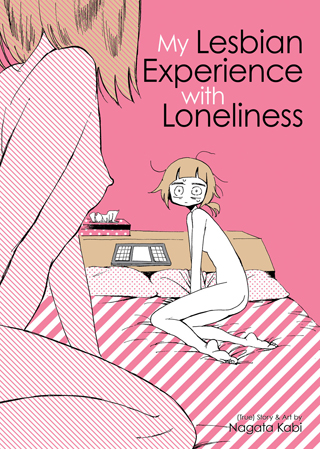
Wonder Woman, we talked about. Woman warriors are hot right now; Wonder Woman has been an icon since she debuted, and despite the bafflement of male comics and movie execs, when presented with unselfconscious admiration, audiences respond to her.
March – well, I don’t need to tell you any more about that. It’s a cultural phenomenon.
While I don’t feel comfortable leaking the entire BookScan list, there are similar signs throughout. Comics retailers may not like diversity, but Marvel’s best selling graphic novel of the year thus far is (wait for it) Black Panther Vol. 2 by Ta-Nehisi Coates and Brian Stelfreeze. The #3 seller is Black Panther Vol 3. (Old Man Logan is sandwiched between.)
While Wonder Woman isn’t on Amazon’s top 20, as I write this, Ms. Marvel Vol. 1, Captain Marvel Vol 1 and Jessica Jones Alias Vol. 1 are. (So are Winter Soldier and Hawkeye Vol. 1). Here’s a screenshot for the record:
It’s no coincidence that Aoki’s Manga is back story for Publishers Weekly and Abraham Riesman’s Forget Brooding Superheroes — the Big Money Is in Kids’ Comics for New York’s Vulture site came out in the same week. The old order doth change, and both genres are big on BookScan. Riesman’s well-sourced piece is another trumpet blast, an ode to the ascendance of kids comics in no uncertain terms. It’s a flag-planter.
As of today, the average superhero comic relies on the enthusiasm of people well into their adult years, ones who enjoy — or at least tolerate — ever-more-convoluted twists on characters with whom they’re already familiar. Though they make occasional stabs at drawing new readers, Marvel and DC’s business decisions have typically been based on the desires of a veteran core. Sales to those people are decent enough to keep those companies afloat for now, but there’s usually been precious little in the way of vision for how to radically expand the market.
But less than a decade ago, a tectonic shift began — and Marvel and DC had nothing to do with it. Traditional buyers like me had nothing to do with it, either. Indeed, the comics Establishment is only just now starting to play a desperate game of catch-up. That shift was the result of decisions made by librarians, teachers, kids’-book publishers, and people born after the year 2000. Abruptly, the most important sector in the world of sequential art has become graphic novels for young people. Call it the Youth-Comics Explosion. It’s redefining the future of an entire art form.
Let me spell it out for you: girls and women, black and white, cis and trans alike, are the driving force behind comics readership expansion. This has been happening for a while, but it’s a full on avalanche now. It’s also something I saw coming 25 years ago. (No one else is gonna pat me on the back so I gotta do it myself.) Seeing the devoted fandoms that female content-consumers developed for anything that interested them, ESPECIALLY genre material like paranormal romance, horror and fantasy – I had a hunch that once they turned their spotlight on comics, the full force of female fandom would bowl over the fragile shreds of male safe spaces like a Mack truck through a pile of empty Axe cartons.
What does this shift mean? Well, for one thing, it means that Marvel–and DC too! – had better start paying attention to new readers instead of pandering to the dwindling ranks of AARP-card carrying pap-pap Bronze Agers. I mean, I know it’s hard to move beyond your own viewpoint, but business is business.
It’s not necessary to fully rehash Marvel’s massive missteps yet again, but how they managed to play it so badly is the real lesson here. I know people like to point out how superficial Marvel’s “diversity hires” are but, guess what, this is a superficial industry. No one else was doing any better. With books like Ms. Marvel and Captain Marvel, and even short runs like A-Force, Marvel had the upper hand in reaching out to new female readers. Keeping Moon Girl and Squirrel Girl going for the Scholastic Book Fair crowd was a smart move.
Yet Marvel couldn’t help blowing it with a bunker mentality, arrogance (always one of Marvel’s signature moves) and, more than anything, mediocre products. Most of the top writers went off to Image, lowered rates meant more generic art, and put it all together and you have a foundering line and no signs that Legacy will create a huge turnaround. The new, darker and female Marvel U was ultimately no more of a continuity buster than the Ultimates universe itself, but older white men who only like to read about other white men couldn’t stop squawking. And some of those doing the squaking were comics retailers and Marvel couldn’t help but prefer their squawks to Comics Twitter.
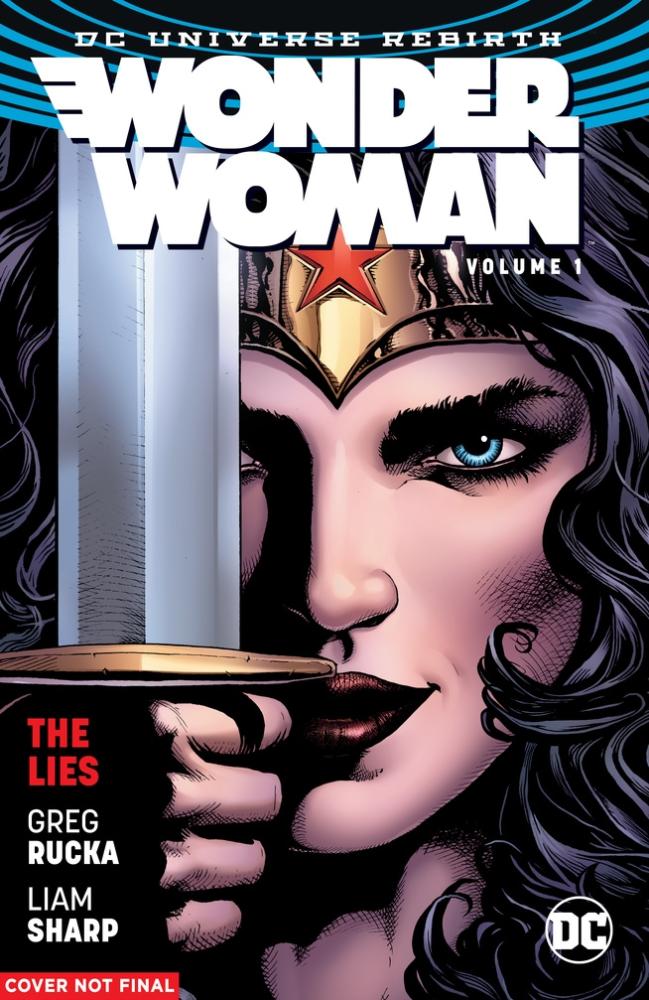
Beyond all this is a shift that has only been spoken of in disbelieving whispers until now, something people in the industry are beginning to talk about openly for the first time.
Pamphlets are a pap pap thing.
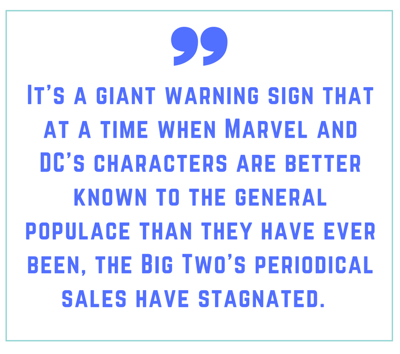
Now, I didn’t say that the number of comics READERS have declined. On the contrary, readers are growing all the time. But they consume their comics in many formats and many platforms. Tie-in graphic novel sales go up every time there’s a successful comic book movie or TV show. Wonder Woman. Old Man Logan. Deadpool. The Walking Dead. I look at these charts all the time and it’s a consistent pattern.
While fashion shifts endlessly, there are still a few fundamental truths that stand the test of time, and one of those, I believe, is my Satisfying Chunk Theory: an ineffable ratio of price to entertainment value that keeps readers coming back.
Pamphlets/periodicals/floppies have been a costly UNsatisfying chunk for a while now. Blame deconstruction. Blame crossovers. Blame mediocre page rates and overworked editors. Blame it all: it’s a complex ratio.
In 2017 there is even more to deal with. People like their chunks bigger than ever. The preferred size for entertainment is binge-sized. In a world where everything is available all the time, people want more of it at once. Prime time viewership of conventional one episode a week TV was down across the board last year. Netflix is now the biggest studio in Hollywood. To compete with streaming a whole season of Orange is the New Black, a 20 page pamphlet must be very entertaining indeed.
While the graphic novel is the format of choice for newer readers, both Marvel and DC have shied away from stand alone graphic novels for a while. Marvel rarely does them, although the ones they do – like Rob Liefeld’s Deadpool book – do pretty well.
DC seems to have completely ditched its original graphic novel program. (I know they announced one a few weeks ago. One.) Why isn’t there a high profile Wonder Woman graphic novel to tie in with the movie? Morrison and Paquette’s Wonder Woman Earth One and Jill Thompson’s Wonder Woman: The True Amazon – a girlhood of Diana story that would be a natural to follow the film – both came out last year. Since they had both been in the works for the better part of a decade, DC couldn’t really have held off. But still..we’ve seen countless rejected pitches for Young Diana comics. Why NOTHING? (Except the ultra successful DC Super Hero Girls line, of course.)
I think there are two reasons for this and both raise uncomfortable questions. The first is that DC Comics just really doesn’t know what to do with Wonder Woman. From the time when she got kicked out of the “trinity” in favor of Green Lantern to The Saga of Wonder Woman’s Brother. Think of all the drama Greg Rucka had to go through – demanding a change in editors, objecting to Frank Cho’s sexualized variants – to get the book out his way.
The second reason is that I suspect Warner Bros. was taken a bit by surprise by Wonder Woman’s success. I have a sneaking suspicion that they didn’t have all that much faith in the character. Given all the missteps, and the awful female superhero movies that preceded it, I get it, but it’s 2017, people.
As you might guess all of this has been on my mind for a while, and there’s much more, including the change in the kind of stories that new readers want to consume. That will have to wait for part two.
I’ve been predicting the demise of the comics periodical for a long time now, and I’ve been wrong before. I’m not saying that traditional comic books/pamphlets are going to go away tomorrow. Or the next day. But think about how the comics business has changed in the last ten years; it’s a sure bet it will have changed just as much ten years from now. Graphic novels are not an ideal format for economic reasons. That applies to both publishers AND creators. Subsidizing the trade via serialization is a sound business model. But it’s problematic for the future of the Big Two to focus so much of their resources on. If they want to be prepared for the comics industry of 2027, they’d better start listening NOW.


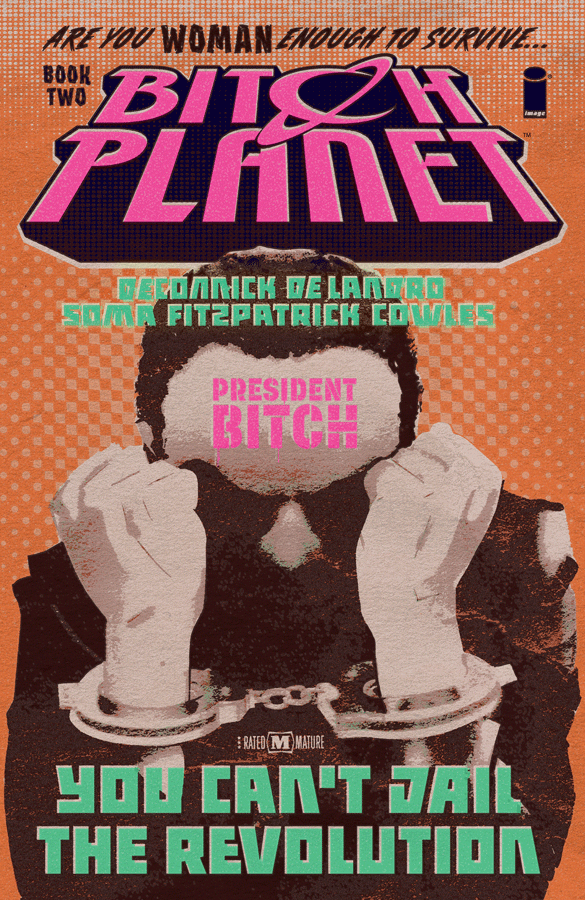
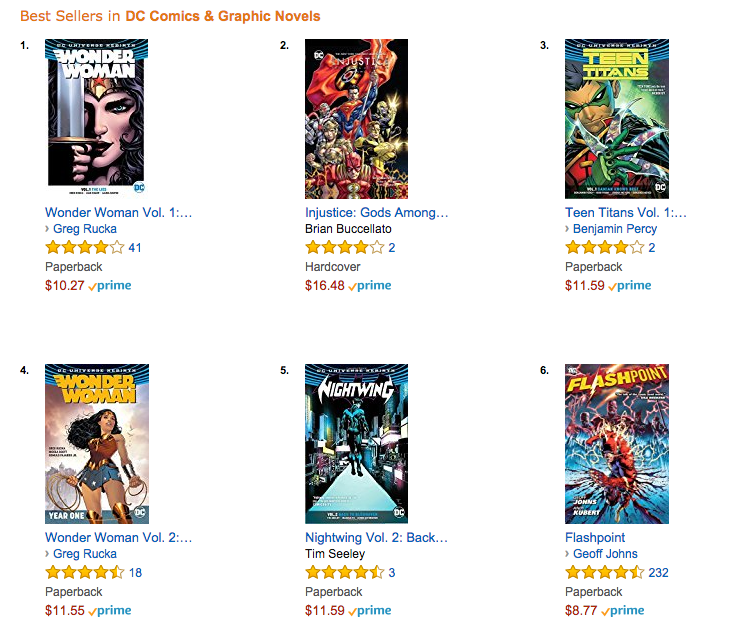

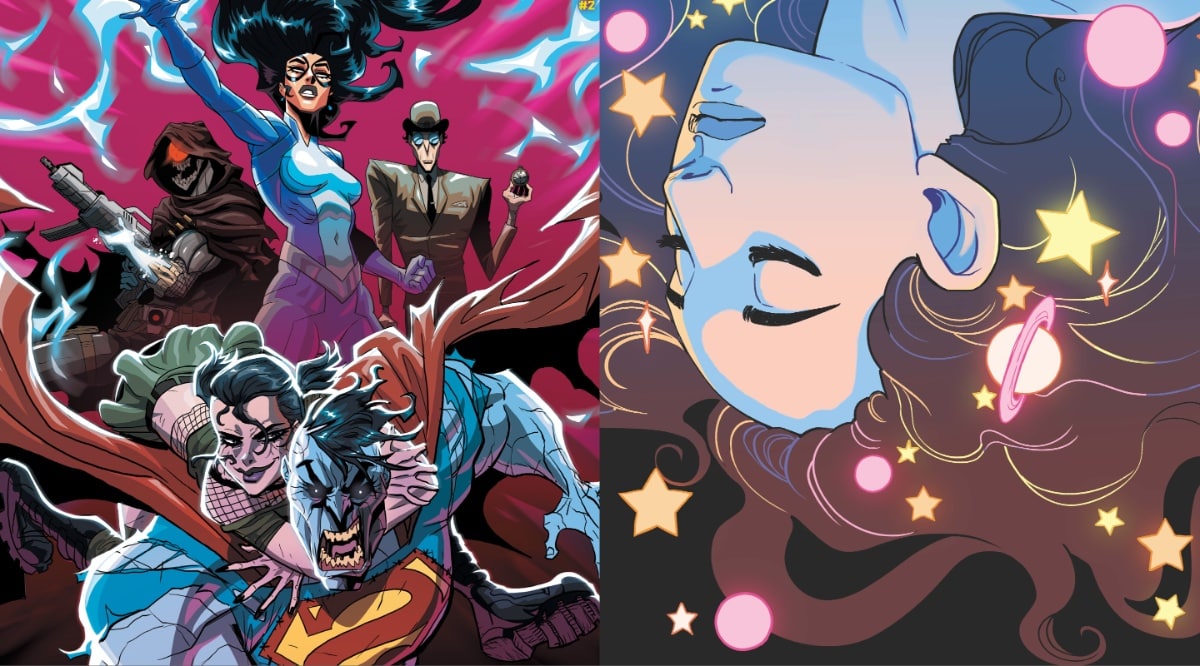
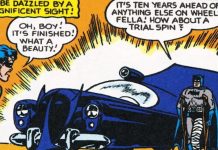
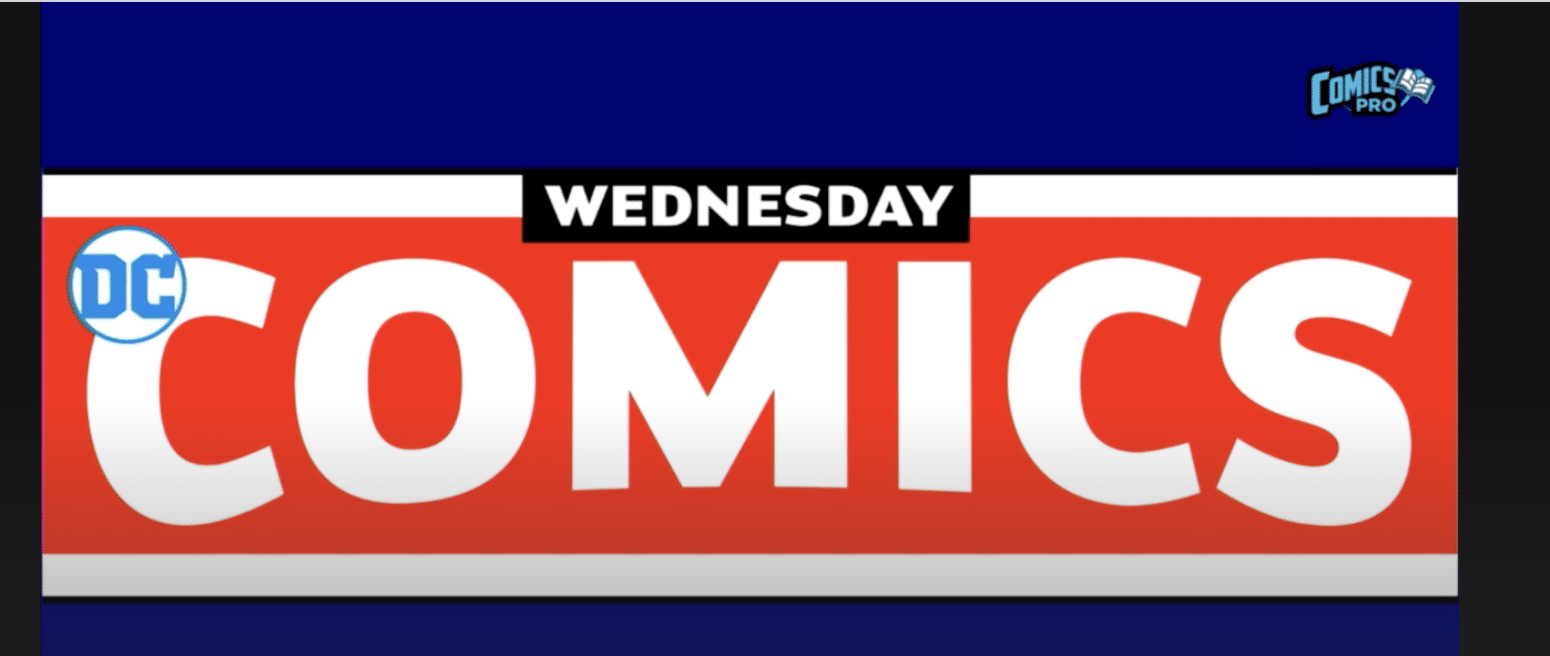
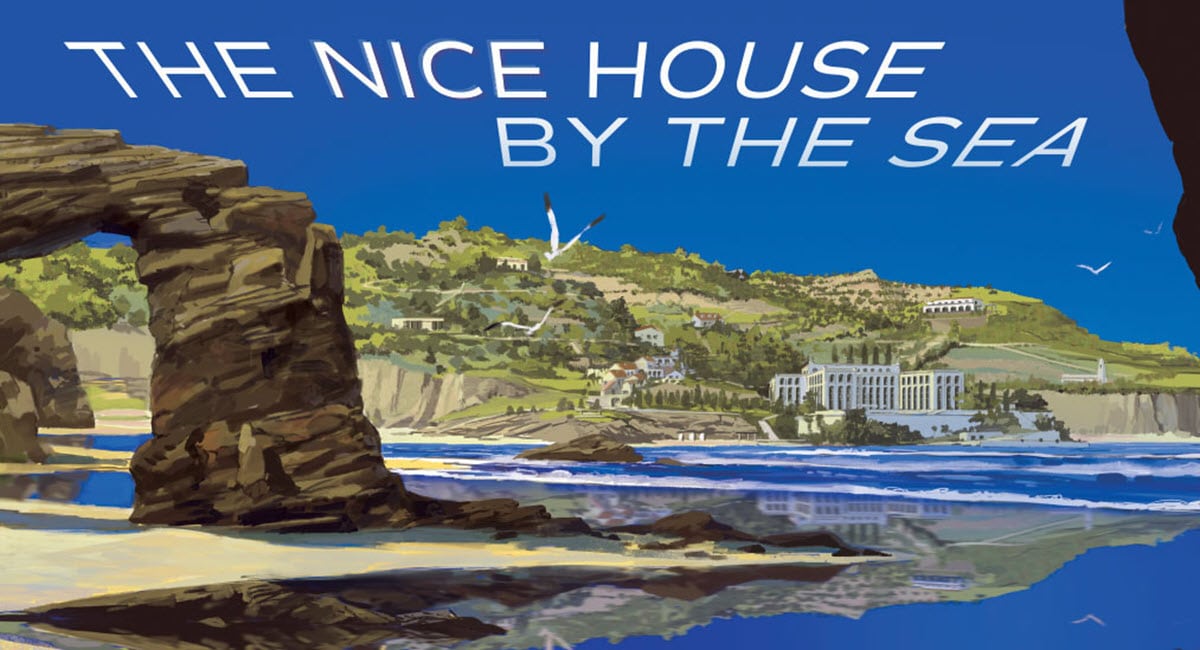
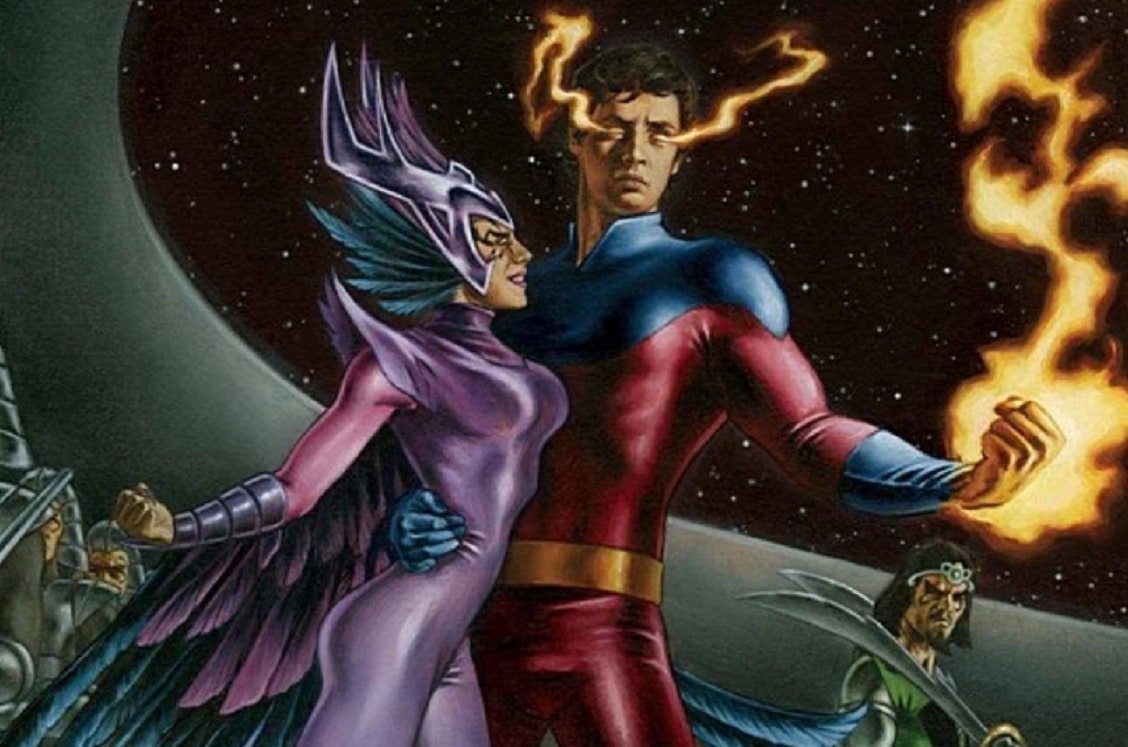
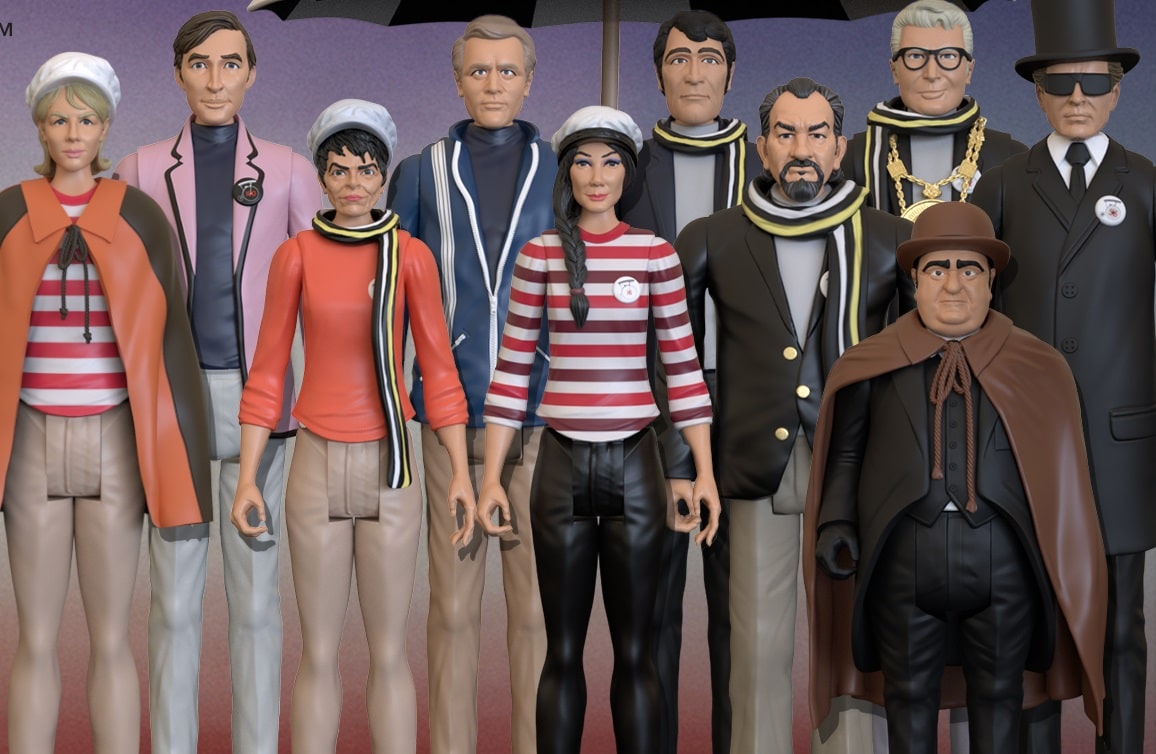

Great read once again Heidi.
On DC’s part. Scott Snyder recently teased a refocus on longer collected stories in the readjustment of how All Star Batman is going to work going forward and said it’s part of a new initiative DC will be trying that I assume will address the Satisfying Chunk Theory you note above. SDCC should be interesting this year if that’s the case.
Once you eliminate all of the Kindle Unlimited comics from the Amazon chart, The Wonder Woman collections do rather well, coming in at #7 & #21 when I did my last weekly round up on Friday: http://yetanothercomicsblog.blogspot.com/2017/06/amazon-top-50-june-16-2017.html
Worth pointing out that Marvel set themselves up in the “binge consumption” market with Marvel Unlimited (which launched way back in 2007, well before the streaming service boom). They’ve done a better job of keeping one eye on the market of the future than they have of producing comics worth reading.
I like Marvel Unlimited, as it makes reading their books actually affordable. Though I suppose that means I’m not buying them the “right” way (vs shelling out $4 an issue).
Re: Young Diana comics: DC *used* to write such stories about Diana’s adventures as a youth in the Silver Age (also how we confusingly wound up with Donna Troy), so not like there’s no precedent. If it worked then (and still works now as shown by DC Super Hero Girls), why not a modernized comic about such? (Same reason I’d have in favor of bringing back a Lois Lane comic; her Silver Age book was one of DC’s top sellers, despite its tone, and there’s a series of young adult Lois Lane novels now published…)
And yet, Marvel has done a better job of making at least part of their line accessible and attractive to young readers than DC (Ms. Marvel, Squirrel Girl, Hellcat, and such). Of course, that’s one of the things the middle-aged neckbeard brigade keeps squawking about…
Marvel and DC trying to cater to young readers has been about as successful and enthusiastic as McDonalds trying to sell salads.
I love how the Marvel “we’re hearing diversity is the issue” comment is still biting them in the ass.
It’s not surprising women focused books are doing better because women are by far bigger readers than men (as groups…I’m sure there are men who read voraciously who will take offense to that). Marketing to women just makes good business sense.
At 53, I abhor the convoluted continuity of crappy stories found in Marvel and DC, the endless events creeping into the regular storylines, and the “edgy” darkness. My pulls currently include Bitch Planet, Paper Girls, Ms. Marvel, Spider-Man (Miles Morales), Moon Girl & Devil Dinosaur, New Super-Man, and (until next week) Wonder Woman as well as Action Comics (though not Super-Man), Astro City, Rom, Micronauts, and Flash. I buy trades-only for many series (Squirrel Girl, Hawkeye, Thor(s), etc.), and I’m a White male, squarely in their demographics. I can’t be the only one not following traditional titles that are crap. Marvel and DC’s content policies make no sense to me, any more than their short-term reliance on events and gimmick cover variants.
Excellent article, Heidi.
I can’t understand the lack of connected products to any superhero movie – again and again, DC and Marvel mess up easy opportunities – but with Wonder Woman it’s doubly (maybe triply?) appalling. They should have put out the Trina Robbins/Kurt Busiek Legend of Wonder Woman mini-series in a collected trade. So easy! It’s a fun story, a great take on Wonder Woman, accessible, enjoyable, kid-friendly – plus it would have built-in extra buzz related to Trina Robbins, a legend in her own right
Another problem: the independent comic stores themselves. Every store I know is 90% oriented toward their dwindling guy customers… and 10% toward the girls and women who could really bring in money if they were given half a chance. I am talking about everything from store lay-outs to stock to posters on the wall. It’s 90% guy stuff, 10% girl-friendly. I know, I know, for years we’ve written about it – and read about it – the boy’s club mentality, the hurdles female readers have to face in person – but this seems to be the end times for the independent comic store.
Regarding methods of publication, there is one floppy that gets it right. Once again, it’s Bitch Planet. The individual issues have the essays, letters, photos, tweets – great content that make for a monthly (almost) connection of liveliness and deep feeling that would be missing from twice-yearly trades. For me, BP’s backmatter is like the Second Coming of the Marvel Bullpen Bulletins, often imitated since the mid-Sixties but never really done right until now. The Marvel Bullpen Bulletins gave us a new kind of comic community then, and that’s what BP is doing, too. It’s like the first time ever… again.
‘AARP-card carrying pap-pap Bronze Agers’
I thought Ageism was bad? I mean seriously, that is just insulting and you should be ashamed of yourself for writing that. Maybe an apology is in order.
You can’t complain about WW having a brother (OMG a brother!!!) and then also insult people for thinking that Thor maybe should be, you know, Thor himself, and not his girlfriend.
DC and Marvel do market to kids, but not through comics. Chapter books, board books, coloring and activity books, read-along story cd’s, joke books, and yes, a few graphic novels — they’re all out there, but not usually in comic shops. I’d love to see sales numbers on all that.
Here’s a sampler:
http://www.capstonepub.com/consumer/search/?Keyword=dc
https://www.amazon.com/s?ie=UTF8&page=1&rh=n%3A4%2Cp_27%3AMarvel
https://www.amazon.com/s/ref=nb_sb_noss?url=node%3D4&field-keywords=dc&rh=n%3A4%2Ck%3Adc
I agree re: the agist phrases. Very surprised by it.
I find it interesting that the stereotype that was once made fun of as nerd comic book readers and losers are now made fun of as racist, sexist, homophobic neck beard who should just leave their hobby. I wish I could read an intelligent article about th rise in certain demography and changing of platforms for comic consumption without such bile and venom. But journalism died long ago and now “news” is nothing but slanted opinions favoring whoever the author believes their audience to be.
What’s a “pap-pap”? I’ve never heard that term before.
Women are the future of comics, both as creators and readers. No question. But I don’t understand why you feel the need to insult long-time male readers at every opportunity.
It’s called “punching up” in comedy. Heidi is using humor to “punch up” at the group that has dominated and controlled the comics scene for decades. This group of (yes) aging male consumers, now dwindling in buying power, insisted for decades on a narrow view of comics as sexist and sexualized power fantasies and promoted their favorite stores as boys’ clubs.
This is not ageism, it’s humor, and really, you should be big enough to handle it. Does using the internet make skin thinner somehow? Is this a real medical condition, or just a mental health issue? Oh, and “pap pap” is an affectionate term for “grandfather.” In fact, the term “AARP-card carrying pap-pap Bronze Agers” fits me closely. I am fifty-nine years old, ready for AARP but not quite retired yet, I am about to become a grandfather for the first time, and I came “of age” during the Bronze Age of comics. I used to buy all the comics there were, just about, and now I have less than five on my regular pull-list – from the majors publishers, anyway.
I also have a daughter, and could see through her eyes the many problems Heidi has so faithfully (and sometimes humorously) addressed in this article and elsewhere.
It’s okay to punch up in comedy… punching down is mean-spirited and just not as funny. That’s why comedians make fun of the rich and powerful, not the poor and meek. The times are changing, but right now men still run the world of comics – from Ike Perlmutter down to anyone who can read the powerful article above and come away focused only on ageism. In the words of Seth Myers and his female-but-somehow-equal comedy partner Amy Poehler, “Really?!?”
Nthing the pushback to the comments about ‘pap-paps’. I’m a middle-aged cartoonist and comics reader, and I’m delighted any time I see the medium opening up to new audiences, new voices, new perspectives. I can understand the bitterness and hostility towards the subset of older male comics fans with narrow minds and backward, inflexible tastes. They can indeed be a toxic bunch. But please, don’t assume those knuckleheads speak for my entire demographic. They sure as hell don’t speak for me!
This middle aged comics reader/buyer/collector doesn’t take offense. I admire anyone willing to punch above their weight class. The activity makes things interesting . Afflict the comfortable, comfort the afflicted. That makes for great humor. This 50+ male prefers to be called a hippy liberal. Not yet a “pap pap” though.
Great article Heidi! I am a 56 year old white male comic store owner since 1989 and I totally agree with everything you have written in this article. I totally trash “AARP-card carrying pap-pap Bronze Agers” all of the time in my store and I am one. If you are offended by this as a middle aged white guy you should just move back in with your parents so they can protect you from those meanie internet bullies. Sheeesh….
My wife and I just opened up a second location last Friday in Pacific Beach in San Diego and we are not stocking floppies at all. We just sell graphic novels/trades and manga with a big selection of Funko, Tokidoki, Gundam models and Kid Robot merchandise along with a well stocked all ages section. We do offer a floppy subscription service but so far no new takers. Business is booming and nobody is even asking about floppies.
Marvel is dead and they are never coming back and most DC books are at or below N52 levels. The writing is on the wall folks. It has been for quite some time.
As far as our graphic novel section is concerned, we display a carefully curated selection of predominately non-DC and Marvel books displayed mostly face out. Marvel trades are DOA except for those damned “diverse” titles which move nicely to new readers and female customers. DC’s ignorant trade policy implemented by their “AARP-card carrying pap-pap Bronze Ager” management continues to hamper their trade sales.
Publishers such as Image, Oni, Boom, Fantagraphics, Koyama Press, Black Mask, Scholastic, IDW, Dark Horse and all Manga publishers get it. That is why their books fly off the shelves in trade. It was very hard making the decision to not sell floppies, but it seems to be working out just fine…..
You can see pictures of our new store at http://www.rsc-online.com if you are interested.
I recognize Comics Beat has to appeal to younger readers, advertisers, etc. I get the “edgy”/humor-attempted writing, but if you said anything condensing about any other segmented group in that tone–even in jest–folks would be raising storm. As pop culture, comics have traditionally appealed mostly to younger folks–the hip, new writers/artists are almost always young; that’s just the nature of it. And good for them. It’s always good to see younger generations find their voice and make their own imprints on the world. I don’t know why Marvel and DC are such a focus–there’s plenty of other publishers (as was noted) that are creating books to appeal to myriad readers. Frankly, they’re probably more focused on making money from movies/TV these days, and that’s their business decision in terms of where they put their resources. Personally, I haven’t ready a floppy or anything from Marvel or DC in 20 years; I prefer small press, Fantagraphics, Top Shelf, etc. Simply put, they produce the kinda comics I enjoy. That said, it seems to me that it’s really at the retail level where the rubber hits the road. In the D.C. area, there several comics shops and each one has a different personality, what books they carry, clientele, etc. There’s a new shop opening up next month–named in memory of a recently deceased local comic book artist–that I’m sure also will be different. Let’s celebrate our uniqueness and differences rather than jab at them.
>>but if you said anything condensing about any other segmented group
I could not have made a better typo myself and that is saying something!
Look people, I am a AARP targeted Bronze Age Memaw myself…why do you think I know the territory so well? It takes one to know one and call one names is the rule, I believe. Groups must self police.
Also read the comments on punching up and down above.
Ed Sherman, your store sounds amazing!!! I’d love to hear more about it.
Heh, good one. Milk on my face for it! :)
As Marvel and DC sales decline, a generation is growing up thinking of superheroes as movie and TV characters, not comic book characters. How much longer, I wonder, will Warner and Disney allow these companies to continue as publishers? DC’s more diversified offerings, such as the Vertigo library, might keep it afloat a bit longer.
I know it won’t happen, but it would be nice if Marvel went back to publishing 8 to 12 titles a month, as they did in the ’60s. In those days, even a kid on an allowance or a person with a modest income could buy the entire line. The price of a comic book then ranged from 10 cents (at the beginning of the ’60s) to 15 cents (at decade’s end)..
Now, with about 75 ongoing series priced at $4 and up, many of them published more often than once a month, nobody can keep up with it. Not unless you’re wealthy and have more money than sense.
” I no longer have access to the weekly numbers as I once did…and even if I did, I’d be honor bound not to reveal them.”
Good thing I feel under no such restriction, then! Here’s the top 20 from last week’s bookscan, and boy does it prove your point. I would argue that they entire top ten are female-skewing or female-created comics.
1 BITCH PLANET, VOLUME 2: PRESID
2 MY LESBIAN EXPERIENCE WITH LON
3 WONDER WOMAN VOL. 1: THE LIES
4 WONDER WOMAN VOL. 2: YEAR ONE
5 FOOD WARS!: SHOKUGEKI NO SOMA,
6 LAZARUS, VOLUME 5
7 SAGA, VOLUME 7
8 YONA OF THE DAWN, VOL. 6
9 SERAPH OF THE END, VOLUME 12
10 KAMISAMA KISS, VOL. 24
11 ASSASSINATION CLASSROOM, VOL.
12 VALERIAN: THE COMPLETE COLLECT
13 NORAGAMI: STRAY GOD 18
14 MY HERO ACADEMIA, VOL. 1
15 DOOM PATROL VOL. 1: BRICK BY B
16 TOKYO GHOUL, VOLUME 1
17 MY HERO ACADEMIA, VOLUME 8
18 THE UNWORTHY THOR
19 BORUTO, VOL. 1: NARUTO NEXT GE
20 DRAGON BALL SUPER, VOL. 1
And here’s this week’s top 20. Go Valerian! But what happened to Bitch Planet? Well, it had a pretty steep drop that placed it below position 50. But before you start coming to any conclusions, this is pretty common; the big initial order for graphic novels is usually Amazon pre-sales, and a steep drop after that is the norm.
1 VALERIAN: THE COMPLETE COLLECT
2 THE WICKED & THE DIVINE, VOLUM
3 INJUSTICE: GODS AMONG US: YEAR
4 WONDER WOMAN VOL. 1: THE LIES
5 SAGA, VOLUME 7
6 WOLVERINE: OLD MAN LOGAN, VOLU
7 TOKYO GHOUL, VOLUME 1
8 TOKYO GHOUL, VOLUME 13
9 MY HERO ACADEMIA, VOLUME 8
10 MY LESBIAN EXPERIENCE WITH LON
11 BLACK PANTHER, BOOK 1: A NATIO
12 MIGHTY MORPHIN POWER RANGERS V
13 MY HERO ACADEMIA, VOL. 1
14 ONE-PUNCH MAN, VOLUME 1
15 THE KILLING JOKE
16 WONDER WOMAN VOL. 2: YEAR ONE
17 DRAGON BALL SUPER, VOL. 1
18 TOKYO GHOUL, VOLUME 2
19 BORUTO, VOL. 1: NARUTO NEXT GE
20 MY HERO ACADEMIA, VOL. 2
It doesn’t matter if you’re punching up or down. If you punch, other people will punch back, and that’s one of the many reasons we have the political hell hole that we’re going to be living in for the next four years. Do we really need to divide comics the same way? Let’s just celebrate the wonderful female creators and their success. Stop the f-in’ punching. I thought the idea was to create an industry where EVERYONE was welcome.
On balance, the kind of growth and diversification of the comics fanbase is clearly a good thing, and I buy and enjoy many of the titles that have become successful as a result of these changing dynamics.
But, sheesh, just -once- I would like to read a column like this from Heidi (who, to be fair, is not the worst culprit when it comes to this sort of thing) or one of her contemporaries that could focus strictly on the positive aspects of this broadening of the reader base (more girls, women, LGBT, etc. are reading comics!) — and resist lapsing into grudge-settling and revanchism (like ‘DC/Marvel should stop ‘pandering’ to Bronze Age fans’ hurdurdur) because some vaguely neckbeardy guy once made fun of the writer at a con, their local comic shop, middle school, etc.
Gatekeeping sucked back when it was guys grilling girls on obscure comics trivia in order to somehow ‘validate’ their ‘fan credentials’ — and it sucks now when online pundits play similar games regarding whose fandom presence is most ‘relevant’, valuable, and/or worth appreciating. It all just ratchets up the kind of tribalism and in-group/out-group gameplaying that is already endemic, at highly toxic levels, in our modern lives.
(Oh, and point of order: if, as the piece argues, we graying Bronze Age types are irrelevant and no longer worthy of consideration or being valued in the slightest — it ain’t ‘punching up’ anymore when you vent your nerdrage in our direction.)
Anyways…hopefully, instead of leading to the long-dreamed-of (at least by the comics tumblr crowd and their fellow travelers) purge of the ‘old school fans’ from comics fandom — what this *actually* means is that the medium/market is heading towards becoming the sort of ‘big tent’ in which all prospective readers can find a few titles that appeal to them. In a mature medium, like film, the idea that you can (much less, should) only have space for Kelly Sue DeConnick’s work -OR- Howard Chaykin’s material would be rightly dismissed as ludicrous. After all, it’s not as if Clint Eastwood and Zack Snyder films aren’t screened in the same multiplexes as, say, Ava DuVernay’s, or that the continuation of ‘Game of Thrones’ is somehow a threat to the existence of the televised ‘Handmaid’s Tale’. Similarly, in any kind of healthy comics market, there should be shelf space (virtual or physical) for Greg Rucka’s fantastic writing *and* Frank Cho’s equally fantastic draftsmanship.
This whole, ‘I’m totes for *inclusion*….except for **those people over there** no comics for (and/or by) **them**!’ really, really, **really** needs to stop.
This is all nice, but what is a “pap-pap”? While we’re at it, what’s a “mee-maw”?
I’m definitely tired of the “battle of sexes” on comics sites. The whole “men bashing women/women retaliating by bashing men” needs to stop. Yes, there are guys who want every protagonist to be a straight white male, but I think they’re a (very) vocal minority.
As for the ‘ageism,’ it doesn’t bother me when it comes from someone of Heidi’s age. I’ve been reading her comics-related writing since the early 1980s, so she clearly isn’t a kid. (I was a college student back then, so I’m not a kid either.) When you reach a certain age, you’ve earned the right to make fun of your peers.
No, this type of thing needs to be called out as not ok. Generally speaking, punching old people *is* punching down.
But as better writers above have pointed out – punching anyway, either up or down has to stop. It doesn’t help get your point across.
It is not a zero sum game.
Y’know, looking at it again, it’s not even *punching.* It’s just saying the Bronze Age fans are basically old grandpas. There’s nothing wrong with being a member of the AARP. There’s nothing wrong with being a pap-pap, grandpa, mee-maw, nana, or granny. Anyone reading ageism into that is seeing a reflection of their own attitudes.
(Not a pap-pap, but boy do my joints ache.)
“Generally speaking, punching old people *is* punching down.”
Except when the person doing the punching is also old, or at least middle-aged.
I might take offense at, say, a 22-year-old writing a column blaming all of his or her problems on Boomers or Gen X’ers. (And I have read many clueless columns and essays like that.) But when someone who’s been writing about comics since Reagan’s first term pokes fun at people HER OWN AGE, I can’t take offense.
Learn to take a joke, guys! Otherwise, you look like the cranky old farts you’re sometimes depicted as.
A recent Atlantic article about Marvel’s woes pointed out that the company doesn’t know how to capitalize on comics that might expand their audience. When Captain Marvel, Ms. Marvel, Mockingbird, Black Panther and Squirrel Girl win critical acclaim and a devoted (if not huge) audience, Marvel doesn’t know what to do. I’m afraid they’ve been selling comics about white male heroes to an audience of white male readers for so long, they have no idea how to grow this new audience.
Is there no woman on the Marvel sales staff, no modern version of Carol Kalish, who might offer some advice?
Maybe someone at Marvel could study the years from the late ’40s to the early ’60s, when girl-friendly romance and teen humor comics kept Marvel (and most of the industry) afloat. We may be heading into a similar era, at least in terms of the audience.
I’m not even 40 yet and I’m sure I’ll get banned for this, but oh well.
All this talk of the writing being on the wall for male fans, especially older ones, is someone seeing what they want to see. If you look at the individual units shipped for trades vs. floppies, more copies of floppies are still sold by far. Now, it may be true that they sell at a lower price point, but they still reach more readers than the trades.
The tone around here has increasingly become an unwelcome one for those with conservative viewpoints or even moderate ones. If you have a different opinion than the mainstream and like old school comics, you’re quickly labeled as old, or out of touch, etc etc. I’ve been coming here for years to read the sales charts columns which I’ve enjoyed, but the insulting tone and sometimes outright disdain for old time readers is getting to be a bit much.
Why do people say Marvel is dead? I think they’re headed in the right direction with their female solo books and books people know from their TV shows and movies.
I think the writing’s on the wall for the floppy. It’s not Marvel’s fault their older white men “fans” aren’t buying these books.
I get knocking Chaykin is flavour of the month with the yoof who have no idea who he is, but is it nessecary to knock him to try big something else up?
And is it a grandpa rant when he’s been doing it for 30 plus years? If there’s a complaint shouldn’t it be that he’s been hitting these beats for so long that it isn’t edgy or bold coming from him?
I’m not even sure Kelly Sue would want to knock Chaykin – even if her hubby didn’t have a swing and a miss collaboration with him (IMO) – he seems to have provided the blueprint for the career path of her and many other Image creators. Build a name on corporate work, then go indepdenant to do ‘mature reader’ political infused genre work, then spin that into better paying TV work!
Personally I’ve been debating dropping Bitch Planet from my pull list due to the constant lateness, meandering story, and now fill in issues by other creators. At least Chaykin can hit a deadline!*
*I just wanted to be mean like Heidi. I’ll probably switch to trade for BP.
I would just like to point out that it’s impossible to “punch up” form the position of an article if the target is the general public. Attacking long time comics fans is ALWAYS punching down, and it’s never a good idea for anyone.
It’s also worth keeping in mind that while female-targeted books do tend to dominate bookstore trade sales (especially the manga produced outside the country), the revenues these books bring in is a fraction of what traditional floppy format books bring in, so it’s not like Marvel and Dc are being crazy here, they are selling the product that it most benefits them to sell. Even the best selling trades bring in about half of what a year of Amazing Spider-Man brings in.
Now that Heidi has identified herself as an irrelevant old fogey, I can stop reading her website. Thanks!
“The revenues these books bring in is a fraction of what traditional floppy format books bring in.” Where did you c0me up with THAT?
Raina Telgemeirer sells millions of $18 GNs. Marvel and DC both reportedly operate at a loss, as far as their publishing wings go. Not that they care, since every film makes $1B worldwide. That’s the point: the Big Two don’t have to operate by the traditional rules of the comics publishing game. But at some point, and we’re hurtling toward that, if nobody is buying, they’re not going to bother printing them.
I don’t understand why it’s an either/or proposition. There’s room for both GNs and floppies in the comix world. The antagonism of a lot of superdude floppy fans toward anything that is not a superdude floppy is a puzzler to me though. I never had that attitude, even when I was a superdude floppy fan. As far as I’m concerned, the more people reading ALL types of comics, the better for us all.
SJWs are why Trump was elected. Maybe if you people try hard enough you can get him re-elected.
And when I call Heidi MacDonald an incredibly arrogant and short-sighted bitch who cherry picks some very narrow statistics to prove her fem-power case, it’s just me using humor as an internet commenter to “punch up” at powerful people who have official website columns as their platform. Fair is fair, right?
The Amazon Marvel list top 15 are comixology unlimited books that people aren’t actually buying individually. It’s probably better to look at the tpbs and HCs
Wonderful article! It’s also nice to see that My Lesbian Experience with Loneliness is reaching such a broad audience.
Steve Replogle said: “Regarding methods of publication, there is one floppy that gets it right. Once again, it’s Bitch Planet. The individual issues have the essays, letters, photos, tweets – great content that make for a monthly (almost) connection of liveliness and deep feeling that would be missing from twice-yearly trades.”
I completely agree. I’d also add Saga as another example of a book that gets floppies right in the same way, thanks to its fantastic letters column.
Honestly, I agree with this article to a point. But I do want to point out two things:
1) Marvel changed all their flagship heroes to appeal to the thus far underrepresented demographics such as female readership and the sales for their books have not improved. They have gotten worse.
2) The majority of the Amazon Kindle top sellers are from IP that’s currently or is about to be released as a movie/TV show.
Honestly, it’s not so much that companies like Marvel are not catering to different demographics. It’s the idea that they need to sell all their output to all their readers. It’s much better to make sure you have books for everyone , a way to make sure your books reach their intended audience, and a way to make all types of books sustainable by varying you publishing practices/startegies.
Comments are closed.